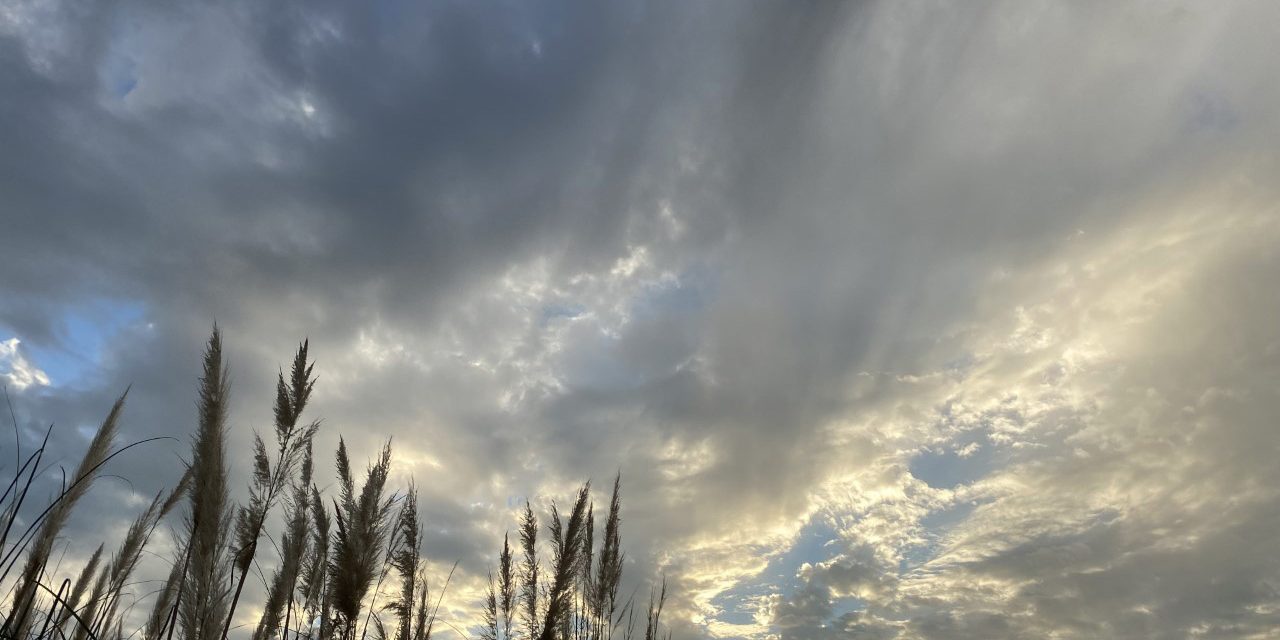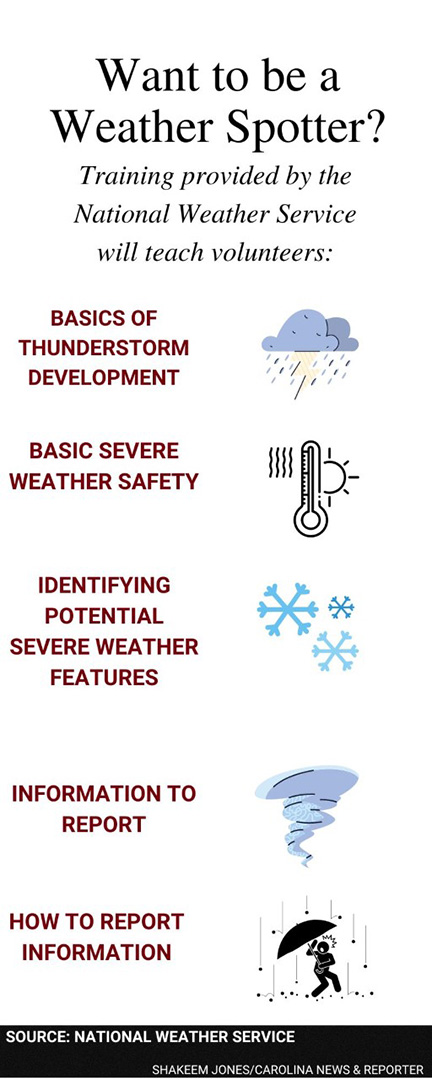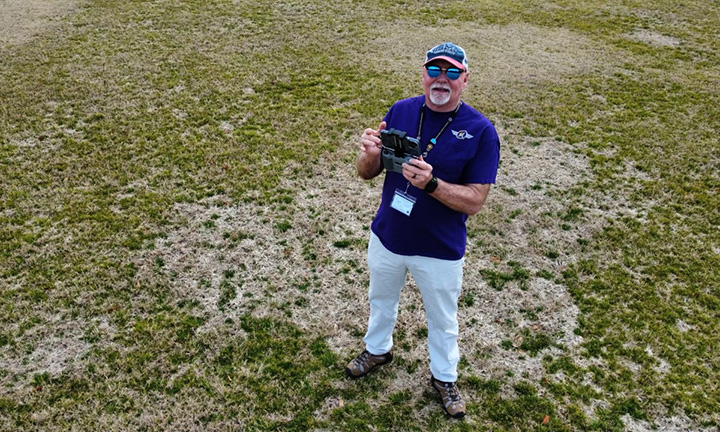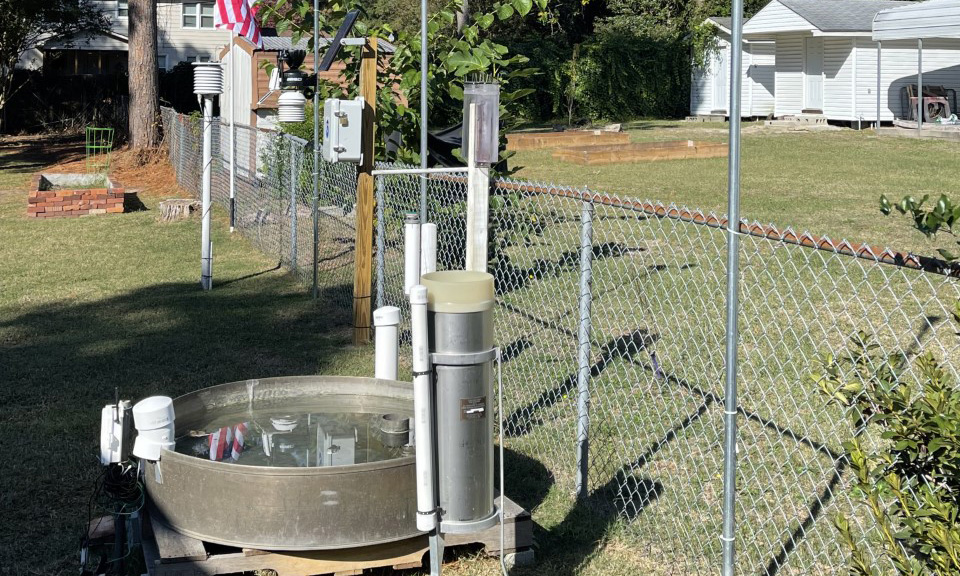The National Weather Service’s Columbia office is looking for weather spotters from different areas of the state. (Photo by Shakeem Jones)
Editor’s note: Shakeem Jones took the class. The certificate confirming him as an official weather spotter is in the mail.
Have a passion for weather? Ever wonder how bad the weather is going to be?
If the answer is “yes” to either, then now’s the time to help the Midlands stay safe from severe weather and become a weather spotter.
The National Weather Service’s Columbia office is offering its last virtual training class of the year to become a weather spotter on Nov. 15. A weather spotter is someone who helps keep local communities safe by providing timely and accurate reports of severe weather, according to The National Weather Service.
Operating out of the Columbia Metropolitan Airport, the office has different tools to observe and forecast weather. But its observation network is limited, said Chris Landolfi, meteorologist for the office.
“Spotters kind of help us to fill in the gaps on areas that we might not get observations from on a regular basis,” Landolfi said. “So that’s why we kind of need those in situations — especially when we’re having severe weather — to give us that extra report.”
Landolfi said a weather spotter can be anyone who has an interest in weather. To participate in the program, the only thing that someone needs to do is to take a two-hour class. Thirty-two people attended a Nov. 3 class.
The first hour was spent teaching volunteers what to report.
“For our severe weather criteria, a severe thunderstorm is either hail that’s an inch, or quarter size or larger, or wind gusts that exceed 60 miles an hour,” said Landolfi ahead of the training session. “For flash flooding, we’re looking for reports of water running across roadways or entering businesses or homes.”
The second hour of training was interactive. Attendees were shown videos of severe weather scenarios. Afterward, they took a poll on what they thought they should include in their weather report. After completion, volunteers were able to register as an official weather spotter.
Billy Tholdorn has been a weather spotter since the 1980s. He moved to South Carolina in 2015 and became a spotter for the Columbia office in 2018.
“I’ve always been an outdoor person — my career is construction,” Tholdorn said. “I’m always outdoors. So I deal with the weather elements of heat and humidity during the summer months, and cold winters during the winter months.”
Tholdorn said he became curious about the weather several years ago and started going to the public library to check out books on the subject. From that point on, weather blossomed into a passion, he said.
Tholdorn has several pieces of electronic weather equipment in his backyard.
“What I have is a maximum-minimum temperature system (where) I record maximum, minimum and observation temperature for the past 24-hour period,” Tholdorn said. “And then I have an 8-inch diameter rain gauge and a 4-inch diameter rain gauge that I use as well.”
Tholdorn records and submits his data to the weather service bright and early — by 8 a.m. each morning.
Landofi said the Columbia office is always looking for reports, but safety is key.
“We’re training people to be spotters, but not necessarily storm chasers,” Landolfi said. “So, in the class, we go over not only what to look for, but also how to stay safe in the various weather hazards that are typically seen here in South Carolina.”
Tholdorn said he considers himself a stationary, severe-storm spotter.
“I stay at home, and I let the storms come to me,” Tholdorn said. “If they don’t come my way, then I have nothing to report.”
Tholdorn said he has no intention of stopping any time soon.
“I’m going to do this ’til the day I die — I’m all in,” he said.
Weather spotter classes are offered by the National Weather Service throughout the year. (Shakeem Jones/Carolina News & Reporter)
Billy Tholdorn said he’s grateful for the National Weather Service’s Columbia office for allowing him to pursue his passion. (Photo courtesy of Billy Tholdorn)
Some of Billy Tholdorn’s special equipment in his backyard. Tholdorn says he uses radar and computer models for his weather reports. (Photo courtesy of Billy Tholdorn)





